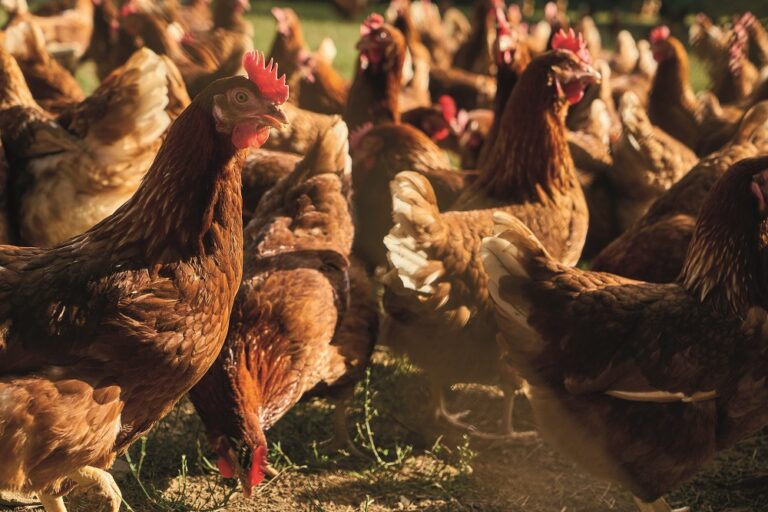Earlier detection of avian flu, and better government support will be crucial in helping the poultry industry learn to live with the risks of avian influenza (AI).
These are among the recommendations made by leading veterinary experts in a new report from CIEL (Centre for Innovation Excellence in Livestock) examining how the UK poultry industry can adapt to the new normal and learn to live with the risks of AI.

While birds may be back out on the range following the end of the mandatory housing order, the threat of AI continues to pose a significant threat. Professor Lisa Boden of the University of Edinburgh and her colleagues were commissioned by CIEL to look at all the evidence from scientific studies in the UK and overseas on the monitoring and control of AI and make the recommendations.
The take home messages from the report include:
- The risk of AI is here to stay
- Industry, government, and small-scale producers need to collaborate to ensure up-to-date and accurate information is disseminated to all those involved
- Government support will continue to be required and enhanced to ensure that all outbreaks are handled promptly and competently
- More research is needed to continue work which is underway on vaccine development, supported by international agreement on availability, distribution and use
- Research into production systems and AI risk is required
Scale of the challenge
The report begins by outlining the scale of the poultry industry –worth around £3.6 billion at farmgate level. Poultry has a key role in UK food production, and anything that threatens it must be taken seriously.
Until now, government policy has been containment and elimination of the disease, and the most effective control measures require slaughter of whole flocks to prevent spread of infection. This can be costly and distressing.
Many experts believe that AI is now here to stay. Outbreaks are occurring throughout the year, in more places, more often, with no summer respite.
Vaccination
The biggest topic of conversation at the moment is vaccination: the practicalities, the costs, the downsides.
As the report sets out, some vaccines have been developed, but vaccination of poultry and most captive birds is not currently legal in the UK, with very few exceptions for some zoo birds. Although vaccination is a promising option in the future, there are many drawbacks currently.
Some of the downsides include:
- Many vaccines require more than one administration within the bird’s lifespan, sometimes with several weeks needed between doses, which is not feasible in wild birds and commercial flocks comprised of thousands of birds, particularly broiler flocks with a short production cycle
- Vaccines may be able to reduce mortality rates due to AI, but there is another concern that vaccinated birds would still be able to carry and transmit the virus without displaying symptoms. This would make it more difficult to trace the virus and could lead to further spread among birds.
The report provides a case study of poultry production in China, where an AI vaccine is widely available and administered to poultry. “A number of challenges remain, even when vaccination is carried out, including reaching backyard poultry for vaccination, practical challenges of implementing full vaccine courses in species with a short lifespan due to the production cycle, and virus spread due to inadequate biosecurity and mixing of birds at markets in a partially vaccinated population,” the report states.
This suggests that however promising vaccines are, it will only ever be one aspect of the successful management of the disease. Mass vaccination strategies in China have been found to show satisfactory effects in reducing outbreaks in poultry, but potential shortcomings have been identified, such as the risk of silent AI infections in poultry or accelerating viral mutation.
The role of technology
Biosecurity is still considered the best method of reducing the likelihood of an AI incursion on poultry premises. However, other innovative uses of technology have been applied to help understand and control HPAI. Mathematical modelling, using multiple big data sources, can be used for prediction of HPAI outbreaks. Rapid detection of outbreaks is also essential and new technology is being developed for detection of disease, such as bio-sensors, image analysis and robot vehicle surveillance.
Further research
One of the factors often overlooked is the interaction between production system and AI, the report states. Birds in free-range systems are perceived to have a higher welfare status but they are at greater risk of infection. Birds that are required to move indoors due to a housing order are at risk of stress as a result of the sudden change in environment.
Future research could examine the effect of housing orders on free-range birds and focus on the opportunity to develop housing systems for such birds, which lowers the risk of Bird Flu and protects their welfare.
Help for producers
The authors of the report are clear more needs to be done to support producers in the ongoing struggle against AI.
Specifically, the report recommends the following:
- There should be increased engagement with all producers, to include small-scale poultry keepers, to disseminate information and develop a common approach to managing AI.
- This would be aided by a register of all bird owners irrespective of flock size. Defra consultation on this is currently underway at the time of writing this report.
- Of utmost importance is support for all those involved in handling an AI outbreak. Support should be freely available to help them cope with the practical and emotional implications of outbreaks.
- In addition, producers should be fully compensated for the financial impacts associated with an AI infected flock.

By Dr Mark Young of CIEL said the report showed many of the challenges faced by the poultry industry are centred around knowledge and communication and there is an overall requirement for all stakeholders to work together to overcome these challenges.
“It is important not to single out producers; more should be done to harmonise the response across the sector as a whole. The advice provided should be unambiguous and prevent the spread of misinformation,” he said.
“More complete data collection and aggregation is needed to inform monitoring and enable proportionate and timely responses to outbreaks. This process should include small-scale flock owners, not just commercial producers. Disease does not respect national borders and aggregated data should be accessible by all four nations in the UK, and ideally also Ireland.”
Read more
Read further news about avian influenza here


